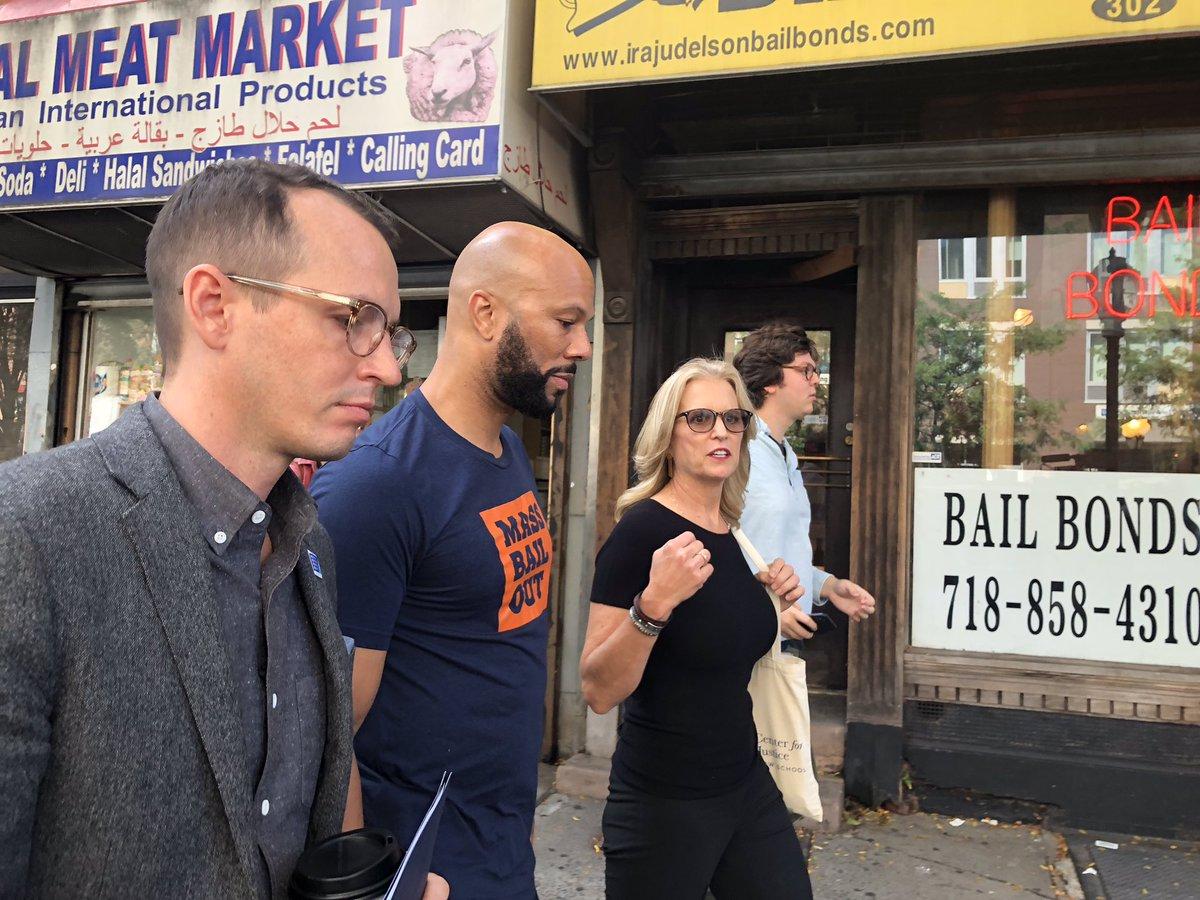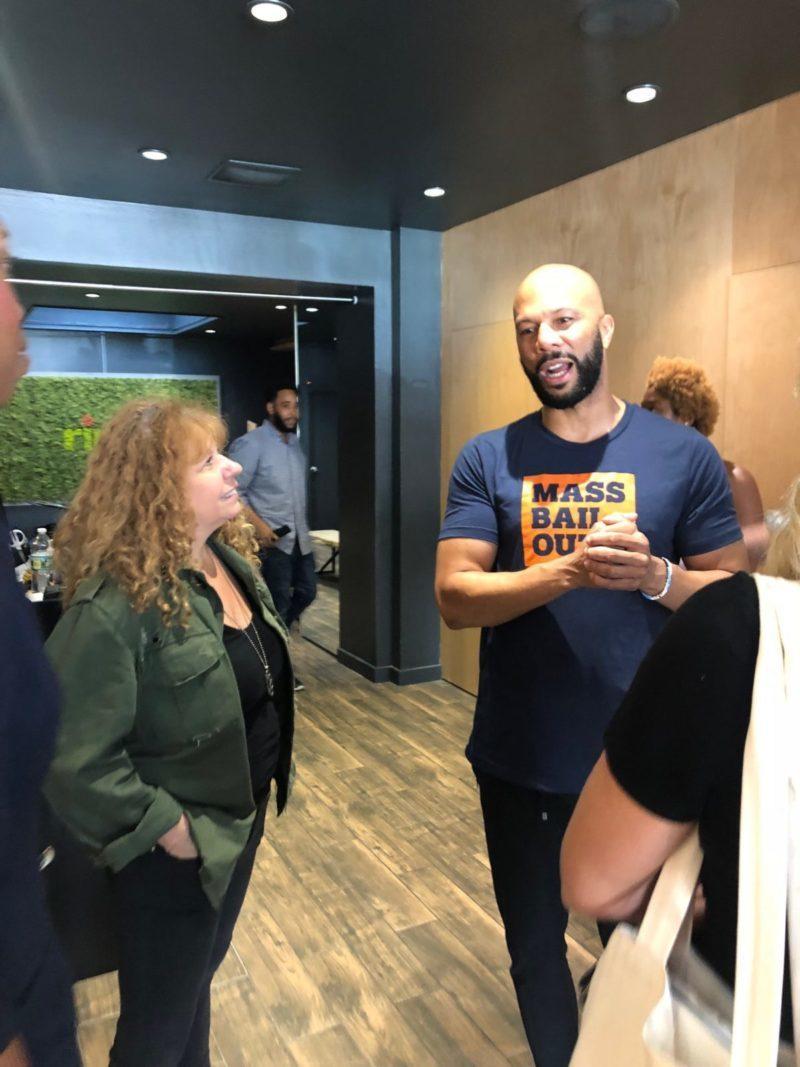Common Bails Out a Stranger
What it’s like to take part in New York City’s Mass Bailout.

This commentary also appears in The Daily Appeal, our newsletter. Subscribe here.
It was nearly 1 p.m. last Wednesday, and Common, the 46-year-old rapper, actor, and criminal justice reform advocate, stood on Atlantic Avenue in downtown Brooklyn, smiling nervously. He wore subtly tapered black pants, gray laceless sneakers, and a fashionable auburn T-shirt. Kerry Kennedy, the president of the nonprofit group Robert F. Kennedy Human Rights, had just handed him a less fashionable T-shirt—navy blue, with the words “MASS BAIL OUT” written across the front. Common tried to express enthusiasm for the shirt, but he clearly preferred his chosen color scheme. “Look at all these stylish people,” he said, gesturing to the group of activists accompanying him, some of whom seemed more stylish than others. “And I’m gonna have the blue with black, and the gray?” But Kennedy didn’t let the matter drop. It was, after all, a photo op. There was a film crew trailing him.
Common was on his way to the Brooklyn Detention Complex to post bail for a woman he didn’t know. He was one of hundreds of volunteers participating in an action that RFK Human Rights calls Mass Bail Out. On any given day, over 7,000 people are jailed at Rikers Island who have not been convicted of anything; they have been charged with a crime but are unable to afford bail. And 87 percent of them are Black or Latinx. The goal of the Mass Bail Out was to free about 350 of the people in this predicament—every woman, 16-year-old, and 17-year-old, regardless of the charges they face—to await trial from home. The point is to show that New York City does not need Rikers and does not need cash bail—the city would be just as safe, and these women and young people can be spared the trauma of jail, not to mention the educational, employment, and familial consequences of being taken away from their lives.

“The only reason this woman is in a cage is that she can’t afford bail,” Wade McMullen, the managing attorney of RFK Human Rights, told Common. “And as soon as she’s in that cage, she’s at great risk for sexual assault, discrimination, and abuse. She’ll be separated from her family and taken from her job.” People who were locked up, he went on, were more likely to be coerced into pleading guilty, even for crimes they hadn’t committed. “The system is set up to help prosecutors,” he said.
Common listened with his arms folded, at one point stroking his close-cropped beard. Eventually, he gave in, agreeing to change T-shirts. “I’m gonna give up fashion for freedom!” he declared. He pulled off his shirt on Atlantic Avenue, quickly replacing it with the RFK shirt. The new color scheme looked fine.
Judges often set high bail in order to detain a defendant. This is a perversion of the purpose of bail, which is to allow people charged with a crime to remain free while they fight their cases, with an incentive to return. Advocates argue that bail should provide a meaningful incentive to return, not a jail sentence. Many urge judges to tailor bail to a person’s ability to pay: $20 could be just as meaningful to one person as $20,000 is to another.
Instead of waiting for judges to change their behavior, groups like RFK Human Rights have set out to change the system themselves. Organizers have gathered money for community bail funds across the country to help people who cannot afford their freedom. RFK Human Rights’s bail action has put the city’s district attorneys “on edge,” writes Professor Jocelyn Simonson. Some have warned that freeing these women and teenagers will jeopardize public safety. “The RFK Jr. [sic] Human Rights ‘mass bailout’ project in New York may sound compassionate, but it’s actually a dangerous and irresponsible intrusion into our criminal-justice system,” Queens District Attorney Richard Brown wrote in the New York Post.
According to Simonson, this reaction “exposes how ‘public safety’ has come to embody a very harmful and narrow definition of which ‘public’ matters.” Evidence indicates that the risk posed by people awaiting trial is exceptionally low, while the risk of violence to people detained at Rikers Island, especially women and young people, is quite high. “The Mass Bail Out,” Simonson argues, “asks us all to reconsider what it means to keep the public safe.”
On the street near the jail, Kerry Kennedy addressed the public-safety question. “If we were truly afraid, then Harvey Weinstein wouldn’t be walking free.” She also noted that, as attorney general, her father, Robert Kennedy, addressed cash bail in the federal system. “Here we are now, having failed to address it at the local level,” she said.
In 2017, Kennedy’s group helped bail out Pedro Hernandez, a Bronx teenager who spent a year at Rikers for a 2015 shooting that he did not commit. Yesterday, the Bronx DA finally dropped the last remaining charges against him. Hernandez, like Kalief Browder, has been called a “poster child” for bail reform.
Common, Kennedy, and the film crew began walking toward the jail. In his new outfit, Common attracted even more attention than he did before. As they walked by, two white women sporting librarian haircuts stopped and stared at his shirt. “That’s a rapper,” one explained to the other. “He’s going to bail someone out.” Three teenagers in gym shorts tried to get Common’s attention—“I rap too! Check out my mixtape!” one shouted—but Common didn’t seem to hear them. I told them that Common was about to bail someone out of jail, and their eyes grew wide. “Oh, word?” said one. “Tell him to free my uncle!”
McMullen prepared Common to go inside to the room where bail gets paid. “It’s not the most efficient system,” he said. Once Common gave over the information—the woman’s name, her ID number, his name—the person at the window would fax it to Rikers; then we would wait for a fax back, which could take an hour or two. McMullen assured him that “we’ve arranged to go to a nice window,” where the officer would expedite the process as much as possible. Common was handed a file containing information about the woman he would be bailing out, and he nodded solemnly as he turned the pages.
Sign here, under “advocate,” McMullen said, helping him fill out the surety form. “You’re the advocate. That’s your relationship.”
“Now I’m an artist, activist, and advocate!” Common said.
They walked into the small bail room, and the lofty rhetoric gave way to bureaucracy. Common approached the bail window, one of two. “Hey, how you doing today?” he said with a smile. “I’m here to bail someone out.” The officer behind the window seemed indifferent—not hostile, not friendly, barely making eye contact. “ID?” she said. Common turned to McMullen: “This is the nice window?” Common handed over the paperwork, then started to wait. He asked if the officer could give him a courtesy call when the fax from Rikers came in, like a restaurant texting a patron when a table becomes available. No luck. He would have to wait in the bail room like everyone else.
At the other window, a woman talked to the officer in loud and frustrated tones. Her bailout attempt did not seem to be going smoothly. Behind us, a man struggled to use a JPay machine.
After about 20 minutes, an officer walked in and told the film crew to stop recording. “Look, Common, we are all very happy for you,” she said, in a tone that seemed to belie her words. “We get it. But you guys just can’t record in here.” The cameras were turned off. Another officer asked for Common’s autograph; a third officer asked Common to pose for a picture.
The bail captain returned with some good news: She’d called the women’s wing of Rikers and they were expediting the paperwork. “That’s where I used to work,” she explained. Even with this VIP treatment, Common would end up waiting nearly an hour. While we waited, he told me how, growing up on the South Side of Chicago, “it became normal to have friends and family members incarcerated. I would visit my uncle in jail. I accepted it as normal.” Then he met Michelle Alexander, the scholar and author of best-selling book The New Jim Crow. (Being Common means having experiences that are not at all common.) Alexander helped him connect the dots between slavery and the prison system, and he realized that mass incarceration was neither “normal” nor inevitable. “I almost felt like I’d been duped,” he said.
When the paperwork was ready, Common stepped up to the window. The officer showed him a photo of the woman, confirming that she was the person he wanted released, and he nodded. “Sign here and press hard,” the officer instructed, handing him some paper with carbon copies underneath. With three swoops of his pen, Common was done. He and the officer wished each other a good day, and he walked back onto the street.
As he headed off to his next engagement, he seemed invigorated by the experience. He even came around on the T-shirt, saying he wouldn’t change back. “I’m gonna rock this today and let people know what I’m about.”
